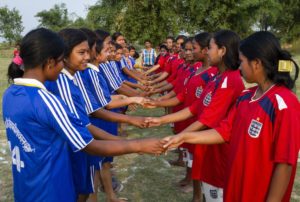Girls shake hands after a game of football on the village field. Ramesh Prasad (centre), Teacher and Coordinator of the Girls’ Sports Clubs explains the importance of this UNICEF-supported pilot programme: ““Before this intervention girls were not involved in sports. People would say, “This is not our culture.” Girls running, jumping and moving like boys was socially unacceptable. So when the school first introduced this programme with volleyball and football, it wasn’t easy to convince the parents to allow their daughters to play. The uniform in particular was
a big hurdle. A generation ago, women were expected to cover themselves from head to toe. They are no longer expected to cover their heads, but they must at least cover the rest. Those who wear revealing clothes are considered vulgar and unacceptable for marriage. But linking these programmes to the school allowed us to overcome both of these challenges. With teachers coaching the teams and supporting the girls,
it was easier to convince people that it was okay.
“This programme has been running for less than a year but I have already seen lots of positive results. One of the most important is social inclusion. There are both Dalits and non-Dalits that participate. Playing sports together has made them more friendly with and supportive of one another. This environment is also appreciated by their parents and the wider community. Because of it, the whole concept of ‘untouchability’ is diminishing.
“This socially conducive environment has also created positive support in the learning environment. Those who need help have started asking for support from other students and the teachers. The girls are actively participating in class, and most important, because they are playing sports they want to come to school, which means they attend regularly.” Nepal National Secondary School, Siyarahi Settlement, Madhuban Mathual Village Development Committee, Parsa district, Nepal.



